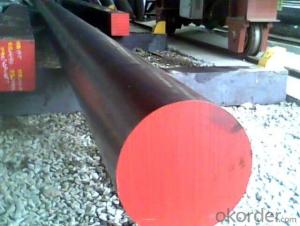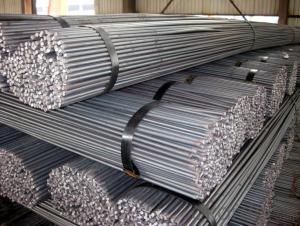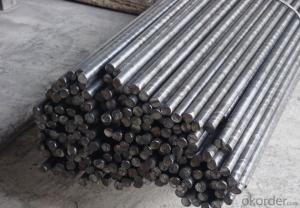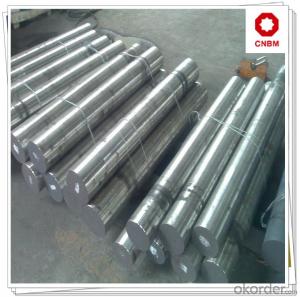Carbon Structural Steel Round Bars SAE1018CR
- Loading Port:
- Shanghai
- Payment Terms:
- TT OR LC
- Min Order Qty:
- 400 m.t.
- Supply Capability:
- 120000 m.t./month
OKorder Service Pledge
OKorder Financial Service
You Might Also Like
Carbon Structural Steel Round Bars SAE1018CR
PRODUCT USE
Carbon steel applies to chemical industry, shipping industry,manufacturing industry, construction, decorate industry, electric power, pump shafts, sanitary wares, furniture handles, boiler, high temperature resistant, low temperature resistant, corrosion resistant.
PRODUCT MAIN POINTS
1, Heat Treatment: normalizing, annealing, tempering, quenching
2, Surface Treatment: black, grinding, bright, polish
3, Product Process: hot rolled, cold drawn, forged
FAQ
1, Payment Terms:
30% T/T deposit & 70% T/T before delivery.
Irrevocable L/C at sight
2, Trade Terms:
FOB, CIF, CNF
3, Delivery Time:
Normally 30-40 days. According to quantity.
4, Manufacture or Trading Company:
CNBM is a state-owned fortune global 500 trading company. We have intergrated supply system.
There are about 20 overseas locations in different countries.
PRODUCT SHOW
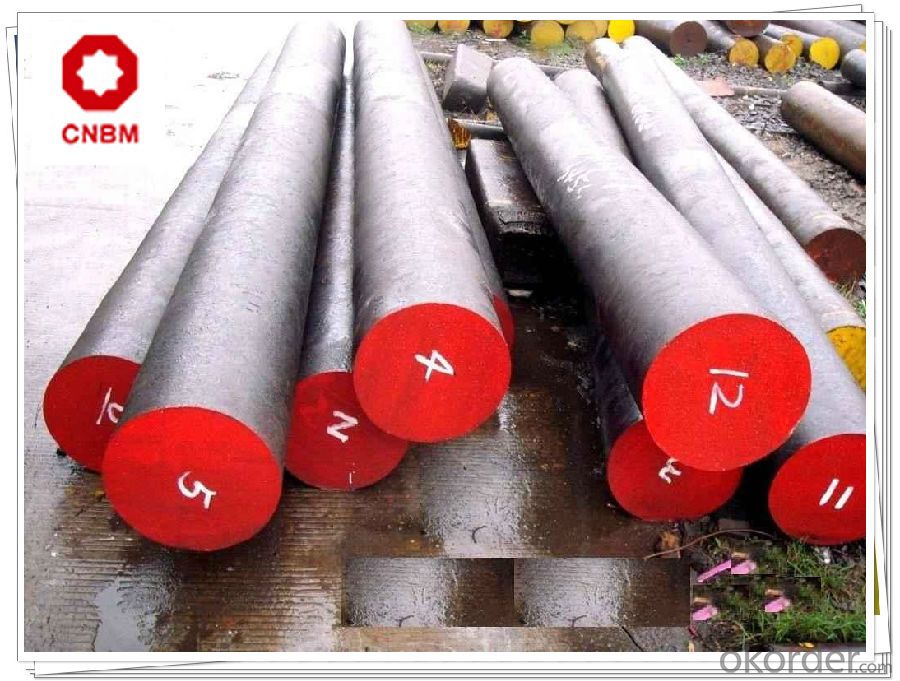
PRODUCT SPECIFICATION
1, Chemical Composition %
| Grade | C | Si | Mn | S | P | Cr | Ni | Cu |
| SAE1020CR | 0.15-0.20 | 0.17-0.37 | 0.35-0.65 | ≤0.035 | ≤0.035 | ≤0.25 | ≤0.25 | ≤0.25 |
2, Mechanical Properties
| Strength of Extension σb | Yield Strength σs | Elogation δ5 | Reduction of Area ψ | Hardness (no heat treatment) |
| ≥410(42) Mpa | ≥245(25) Mpa | ≥25 % | ≥55 % | ≤156HB |
ABOUT US


- Q:Can steel round bars be bent?
- Yes, steel round bars can be bent. The flexibility of steel allows it to be shaped and manipulated into various forms, including bending round bars into desired angles or curves.
- Q:Can steel round bars be used in the oil and gas industry?
- Indeed, the oil and gas industry finds great utility in steel round bars. These bars find widespread application across various sectors within the industry, encompassing drilling, production, and transportation of oil and gas. Their exceptional durability and high strength render them well-suited for enduring the arduous and demanding conditions typically encountered in this sector. They play a crucial role in the construction of drilling equipment, such as drill collars and drill pipes, along with the production of valves, pumps, and other vital components. Moreover, steel round bars contribute to the fabrication of pipelines and offshore platforms, wherein they provide structural support and guarantee the integrity of the infrastructure. All in all, the oil and gas industry deems steel round bars indispensable due to their robustness, dependability, and capacity to withstand the challenging environments encountered within this sector.
- Q:Can steel round bars be coated or plated?
- Steel round bars can indeed be coated or plated, which is a prevalent method employed to augment the functionality and visual appeal of steel products. Numerous choices exist for coating and plating, including zinc plating, chrome plating, nickel plating, and powder coating. These procedures offer added defense against corrosion, enhance durability, and create the desired aesthetics for the steel. The selection of the appropriate coating or plating technique hinges upon the particular application and specifications of the steel round bars.
- Q:How do steel round bars compare to fiberglass round bars?
- Steel and fiberglass round bars possess distinct characteristics and applications, rendering them appropriate for diverse purposes. Renowned for their robustness and resilience, steel round bars are commonly utilized in the construction, manufacturing, and engineering sectors, where strength and load-bearing capacity assume paramount importance. With the ability to endure heavy loads, steel round bars prove ideal for structural applications like beams, columns, and supports. Furthermore, steel round bars exhibit exceptional resistance to impact, wear, and corrosion, rendering them fitting for outdoor and high-stress environments. Conversely, fiberglass round bars offer exclusive advantages. Fiberglass, being both lightweight and non-conductive, finds suitability in applications where electrical conductivity or weight constitutes a concern. Frequently employed in the electrical and telecommunications industries, fiberglass round bars provide insulation and enhance safety. Moreover, they exhibit resistance to corrosion, making them appropriate for outdoor and marine applications. Considering cost, steel round bars generally prove more affordable than their fiberglass counterparts. Given the wide availability of steel and its relatively low production costs, it serves as a cost-effective material. Conversely, fiberglass necessitates specialized manufacturing processes and materials, thereby potentially increasing its overall cost. Ultimately, the selection between steel and fiberglass round bars hinges on the specific requirements of the intended application. Should strength, durability, and load-bearing capacity hold critical significance, steel round bars emerge as an excellent choice. However, if considerations such as weight, electrical insulation, or corrosion resistance assume prominence, fiberglass round bars may prove more suitable.
- Q:What is the maximum sulfur content allowed for steel round bars?
- The maximum sulfur content allowed for steel round bars typically depends on the specific grade or standard being followed. However, in general, the maximum sulfur content is often restricted to 0.050% or 0.060% by weight.
- Q:Can steel round bars be used for making exhaust systems?
- Indeed, exhaust systems can be fabricated using steel round bars. Steel, being renowned for its endurance, resistance to heat, and capacity to endure extreme temperatures and harsh surroundings, is widely favored as a material for exhaust systems. By utilizing steel round bars, one can fashion the pipes, mufflers, and other constituents of an exhaust system. Moreover, these bars can be readily welded and molded into the preferred shape, enabling customization and design flexibility. Furthermore, steel round bars can furnish the essential strength and structural soundness imperative for an effective and enduring exhaust system.
- Q:How do I determine the strength and hardness of a steel round bar?
- In order to assess the strength and hardness of a steel round bar, various methods and tests can be employed: 1. Tensile Test: The strength of a steel bar is commonly determined through this method. It involves subjecting the bar to a tensile force until it fractures, and measuring the maximum force or load it can endure. This test provides information on the bar's ultimate tensile strength, yield strength, and elongation. 2. Hardness Test: Several techniques, such as the Rockwell, Brinell, and Vickers hardness tests, can be utilized to measure the hardness of a steel bar. These tests entail indenting the bar's surface using a standardized indenter and gauging the resulting indentation size. The obtained hardness value indicates the bar's resistance to deformation and wear. 3. Charpy Impact Test: This test gauges the toughness of a steel bar by striking it with a swinging pendulum and measuring the energy absorbed during fracture. It helps assess the bar's ability to withstand brittle fracture under conditions of impact loading. 4. Microstructural Analysis: Examining the microstructure of the steel bar through microscopic observation can offer insights into its mechanical properties. By preparing a polished and etched sample and inspecting it under a microscope, the presence of different phases, grain size, and any structural irregularities can be observed. Various microstructural features can impact the bar's strength and hardness. 5. Chemical Composition Analysis: The chemical composition of the steel bar, particularly the carbon content, significantly influences its strength and hardness. Analyzing the composition using techniques like spectroscopy or chemical analysis can provide valuable information about the bar's mechanical properties. It should be emphasized that these tests and techniques must be carried out by qualified professionals in a controlled laboratory setting to ensure accurate and reliable results. Moreover, specific standards and specifications may exist for different applications, so referring to relevant standards and guidelines can offer further guidance on determining the strength and hardness of a steel round bar.
- Q:Can steel round bars be used in the manufacturing of heat exchangers?
- Yes, steel round bars can be used in the manufacturing of heat exchangers. Steel is a commonly used material in heat exchanger construction due to its high strength and thermal conductivity. Steel round bars can be formed and welded into various shapes and sizes to create the necessary components of a heat exchanger, such as tubes, headers, and baffles. The steel material also provides durability and resistance to corrosion, making it suitable for use in various industrial applications where heat transfer is required.
- Q:Can steel round bars be used in the production of construction materials?
- Yes, steel round bars can be used in the production of construction materials. Steel round bars are commonly used in the construction industry due to their high strength and durability. They can be used to reinforce concrete structures, such as beams, columns, and slabs, providing additional strength and stability. Steel round bars can also be used in the fabrication of steel frames, trusses, and other structural components in buildings and bridges. Their versatility and ability to withstand heavy loads make them a popular choice in the construction industry.
- Q:Can steel round bars be used for making fasteners?
- Certainly! Fasteners can indeed be made using steel round bars. Manufacturers commonly utilize steel round bars to produce fasteners like bolts, screws, and rivets. The strength and durability of steel make it an excellent choice for fasteners, as it can endure significant stress and ensure a secure connection. Moreover, steel round bars can be conveniently machined and threaded to achieve the desired shape and size required for fasteners. In summary, steel round bars are highly dependable and frequently employed in the manufacturing process of fasteners.
1. Manufacturer Overview |
|
|---|---|
| Location | |
| Year Established | |
| Annual Output Value | |
| Main Markets | |
| Company Certifications | |
2. Manufacturer Certificates |
|
|---|---|
| a) Certification Name | |
| Range | |
| Reference | |
| Validity Period | |
3. Manufacturer Capability |
|
|---|---|
| a)Trade Capacity | |
| Nearest Port | |
| Export Percentage | |
| No.of Employees in Trade Department | |
| Language Spoken: | |
| b)Factory Information | |
| Factory Size: | |
| No. of Production Lines | |
| Contract Manufacturing | |
| Product Price Range | |
Send your message to us
Carbon Structural Steel Round Bars SAE1018CR
- Loading Port:
- Shanghai
- Payment Terms:
- TT OR LC
- Min Order Qty:
- 400 m.t.
- Supply Capability:
- 120000 m.t./month
OKorder Service Pledge
OKorder Financial Service
Similar products
New products
Hot products
Hot Searches
Related keywords









